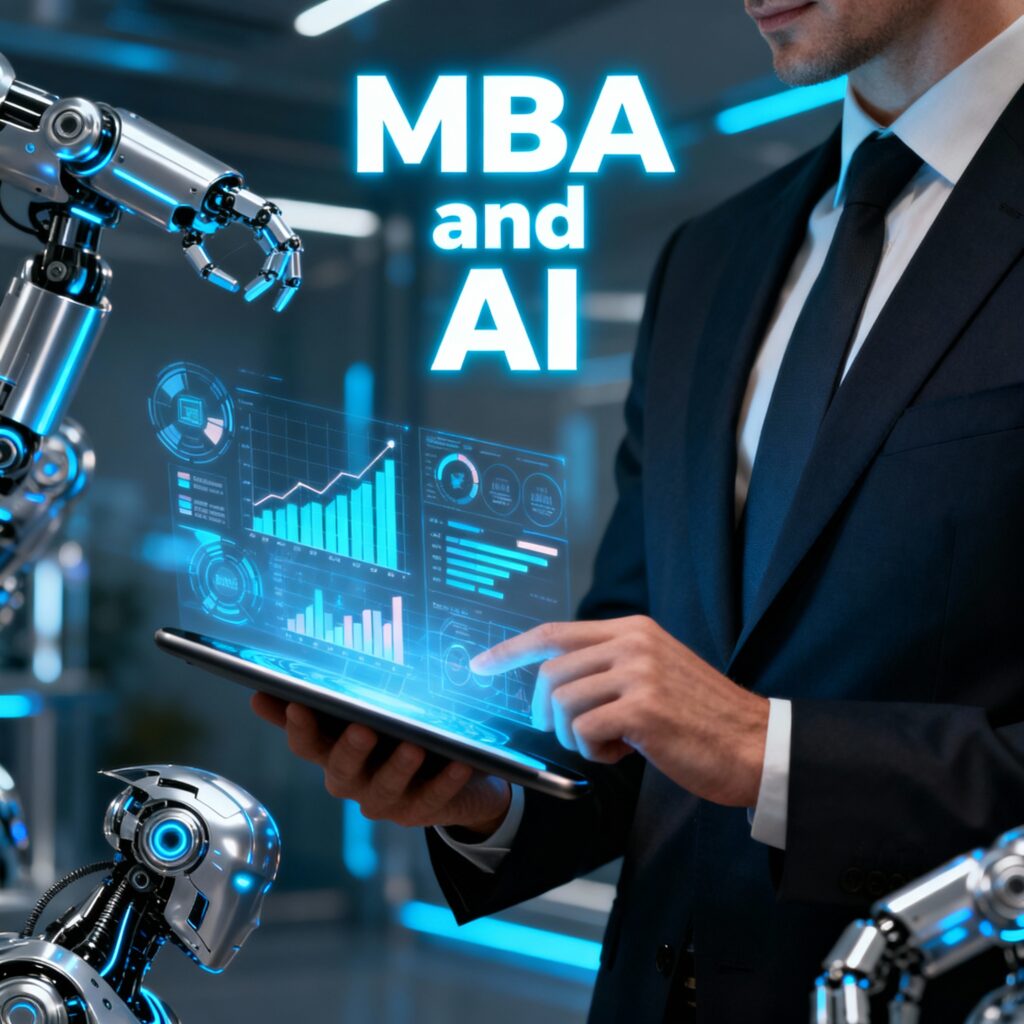AI isn’t replacing MBA careers — it’s rewriting the rulebook. Those who adapt will lead the next era of business — not be left behind.

This article breaks down the shift in five clear parts:
- The Current Reality
- Where AI Is Disrupting MBA Careers
- Roles Most at Risk
- The MBA Advantage in the Age of AI
- The Future Skills MBAs Must Build
Over the past few years, the conversation around MBA careers has shifted dramatically. Headlines have suggested that artificial intelligence is making MBA degrees obsolete. Claims like “AI is killing MBAs” or “MBA careers are dead” have sparked fear among business graduates and professionals considering an MBA. However, the true picture is far more nuanced. Yes, AI is transforming the business landscape and changing the type of work MBA graduates do — but transformation is not elimination. MBA careers are evolving, not disappearing.
Major consulting and financial firms have made drastic changes in how they hire and operate. McKinsey recently laid off thousands of employees, yet simultaneously expanded its AI workforce (McKinsey – The State of AI Report PDF). Goldman Sachs reports that creating client pitch presentations now takes 50% less time due to AI (Goldman Sachs – “AI: In a Bubble” Report). Business schools are experiencing one of the most challenging job placement phases in decades. However, MBAs with strong AI skills are earning significantly more than traditional graduates, and top-tier business schools still maintain near-full placement rates.
So what is truly happening? Why are MBA hiring numbers falling, yet AI-literate MBA graduates becoming more valuable? The answer lies in understanding how AI is transforming business roles, eliminating certain functions, and amplifying the importance of human-centered leadership and strategic skills.
1. The New Reality: MBA Careers Are Transforming, Not Shrinking
AI is now capable of performing many of the analytical and process-driven tasks that early-career MBA professionals were traditionally hired for. Activities that once required weeks of effort — market research, business planning, financial modeling, or industry analysis — can now be executed in hours using AI tools. A research report that once justified multi-million-dollar consulting contracts can be generated in minutes through platforms like ChatGPT, Perplexity, Gemini, or Claude.
This alone has forced companies to rethink how they utilize MBA talent.
Management consulting firms, historically one of the top employers of MBAs, are hiring fewer junior consultants. The demand for manual PowerPoint slide creation, first-level research, and basic data synthesis has dropped because AI executes these tasks faster, cheaper, and with comparable accuracy. Meanwhile, AI utilization across consulting operations has reportedly increased by over 50% in the past year alone.
Similar patterns are visible in finance, tech, and corporate strategy roles. Companies are no longer building large early-career analyst teams. Instead, they prefer compact, more specialized teams supported by powerful AI tools — teams that can deliver more work at a faster pace.
However, this doesn’t mean MBA opportunities are shrinking. They are evolving. Organizations still need business leaders, problem-solvers, and strategists — but they need far fewer people focused purely on execution and far more individuals skilled in decision-making, leadership, and navigating complexity with AI as a partner.
In other words:
AI hasn’t reduced the importance of MBAs — it has raised the bar.
2. Where AI Is Disrupting Traditional MBA Job Functions
To understand the shift fully, one must analyze which parts of MBA work AI can now do effectively. Below are core domains historically owned by business graduates that AI now assists or automates:
Market and Industry Research
AI can now aggregate information, analyze trends, and generate insights with remarkable speed. What used to require weeks of secondary research, interviews, surveys, and competitor analysis can now be executed within hours.
Financial Modeling and Data Analysis
Tools such as ChatGPT with spreadsheet plug-ins, AI-driven analytics platforms, and financial modeling assistants have automated the creation of valuation models, forecasts, investment pitch materials, and even scenario planning.
Presentation and Communication Material
PowerPoint creation — once a foundational skill of MBA jobs — has become semi-automated. AI tools can now design slide decks, structure narratives, and prepare investor or client presentations in minutes.
Business Planning
AI can now build business cases, create feasibility assessments, and offer strategic recommendations at a speed humans cannot match.
Because of this, companies no longer need large teams of junior associates performing foundational tasks. They need fewer, more capable professionals — those who can interpret AI output, challenge assumptions, make judgment-based decisions, and implement strategies.
3. The Roles Most at Risk in the AI Era
While MBA careers remain relevant, certain job profiles are more vulnerable to automation — especially at the entry level. A projection suggests that by 2030, about one-third of all work hours performed by MBA graduates will be automated, impacting specific roles more than others:
Junior Financial Analysts
These roles historically involve data entry, financial modeling, number crunching, and building spreadsheets — tasks AI now performs faster and with near-zero error.
Junior Consultants
Early-career consultants typically spent a majority of their time preparing slides, conducting industry scans, or compiling research for senior consultants. AI now executes these tasks quickly, reducing the need for large junior teams.
Marketing and Market Research Analysts
AI-driven tools can run customer sentiment analysis, benchmarking, consumer surveys, and campaign analytics more efficiently than human analysts managing them manually.
Business Operations Analysts
Process optimization, reporting, and performance dashboards are now automated through AI workflow systems and business intelligence platforms.
These roles are not disappearing entirely — but the number of people needed to do them is decreasing. Entry-level professionals can no longer rely on technical execution alone. To remain relevant, they must bring layered value — such as AI fluency, strategic thinking, leadership, and human-centered problem-solving.
4. The MBA Advantage: What AI Cannot Replace
Despite the automation of analytical tasks, the core value of an MBA continues to lie in the areas AI cannot replicate — especially those involving human dynamics, judgment, emotional intelligence, and collaborative influence.
A. Stakeholder and Organizational Change Management
Data-based recommendations are useless if an organization cannot execute them. Real impact happens when people, teams, and entire companies adopt change — and that requires a very human skill.
Recommending strategy is easy. Implementing it is extremely difficult because it involves:
• Convincing resistant stakeholders
• Aligning teams with conflicting priorities
• Managing organizational politics
• Driving cultural transformation
• Navigating interpersonal dynamics
Guiding people through change is not a technical process — it’s a human journey. AI cannot negotiate, empathize, read emotional cues, build political capital, or motivate large groups to embrace change. Organizations need leaders who can drive execution, not just produce insights.
B. Creative and Contextual Problem-Solving
AI can present multiple solutions, but truly creative problem-solving requires:
• Contextual understanding
• Imagination and experimentation
• Real-world constraints evaluation
• Human intuition
• Integrating cross-disciplinary perspectives
Business problems rarely have one perfect answer. They require judgment. They require understanding human behavior, cultural nuances, market timing, and competing priorities. AI can support decision-making — but it cannot take responsibility for the decision itself.
C. Leadership in Times of Uncertainty
Business crises expose the limits of automation. No AI system can lead an organization through volatility, ambiguity, or unexpected disruption.
Consider global crises, recessions, supply-chain breakdowns, or sudden market shifts. The leaders who successfully navigate challenging periods rely on qualities AI does not possess:
• Courage and empathy
• Adaptability and grit
• Crisis-time decision-making
• Ability to inspire confidence
• Moral responsibility
Leadership is earned through experience, trust, and human connection — all inherently human traits.
D. Building Relationships and Trust
Business has always run on trust, credibility, and relationships. Contracts and data matter, but deals close because people trust each other.
Trust is built through:
• Reputation
• Past performance
• Interpersonal rapport
• Ethical conduct
• Mutual respect
AI cannot replace the handshake, the personal commitment, or the trust that comes from a relationship cultivated over years. It cannot replicate the emotional intelligence required to negotiate partnerships, secure investments, lead teams, or manage executive stakeholders.
5. The Future of MBA Careers: Skills That Will Define Success
The value of an MBA is not diminishing — it is shifting toward a new kind of professional: The AI-empowered business leader.
MBA graduates who thrive in the AI era will combine business acumen with technological fluency and human-centered skill sets. Below are the high-value skills shaping the future:
AI Literacy and Tech-Augmented Decision-Making
Understanding how to use AI to research, analyze, model, validate, and accelerate business decisions.
Strategic and Systems-Level Thinking
Seeing the business as an interconnected system and making choices that consider long-term implications and cross-functional impact.
Execution Leadership
The ability to turn ideas into action with cross-functional teams — not just generate insights.
Behavioral and Emotional Intelligence
Leading humans, influencing outcomes, and managing change with empathy and psychological awareness.
Innovation and Entrepreneurial Thinking
Being able to create, test, scale, and revise solutions rapidly in dynamic environments.
Conclusion: AI Is Not the End of MBA Careers — It’s the Upgrade
AI has automated the technical, manual, and repetitive aspects of early-career MBA roles, reducing the need for large junior teams. But this shift has only increased the premium on skills that are deeply human — leadership, creativity, innovation, stakeholder influence, and trust-based relationship building.
The future MBA is not the analyst who spends dozens of hours crunching data or formatting slides. The future MBA is the leader who uses AI to accelerate execution, enhance decision-making, and drive transformation with a human touch.
AI is not a competitor to MBAs — it is a catalyst pushing them to evolve into stronger, more strategic, and more impactful leaders.

